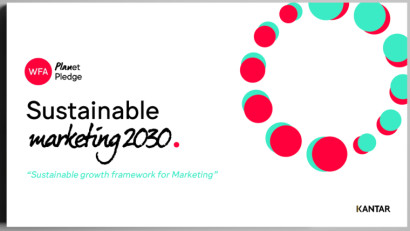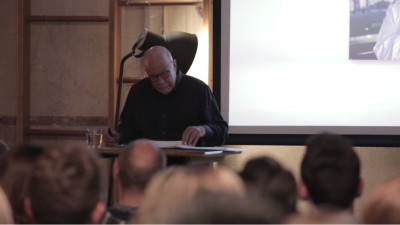Thinking about the future is equally scary as it is exciting. And while most of it remains unknown, one thing looks certain: digital is here to stay and to challenge the status-quo.
Wondering what new challenges digital puts forward, we turn for answers to Sir Martin Sorrell, the founder of the world's largest advertising and PR group - WPP.
In a recent interview for the World Federation of Advertisers in the context of Global Marketer Week ’19, while discussing topics like the future role of the marketer, long-term thinking in branding and media companies being disguised as technology companies, Sir Martin Sorrell follows the trail of digital disruption and questions the current industry and its players.
Inspiration Archive aims to become a place for thought-provoking content coming from the world’s top publishers. We do the work of finding inspirational videos, converting them into text and sharing them, but we leave it to you to get inspired.
The CMO of the future
The skills of the marketer have changed enormously. Because the definition of creativity or the definition of our industries is so broad now - covering data analytics and media and all areas, the skills of the marketer have got to be much broader too. I would argue the skills have to encompass the sales organization as well.
Amazon, for example, is very focused on the sales function. It;s very focused on that 400 billion of trade budget that exists. The marketer has to think about marketing and sales as one, particularly in a digital era. The skills demanded are very broad, very wide, and that's needed to counterbalance this cost pressure that we've seen, and the rise of procurement and finance.
Maybe in 2008 marketing was up and finance and procurement were down, in terms of power balance. I would argue that procurement and finance have become more powerful than marketing. I think that balance has to be redressed. And one of the ways of redressing it is to make sure the marketer has as broader capability covering information technology and covering data too.
Advertising and marketing now are like running an election campaign without an election date.
In the last 48-72 hours we've had: Apple TV launched, Apple launching a credit card with Goldman, which turns the financial services upside down and the media industry poses more and more issues for SVODs, for free-to-air television, content providers etc. And we've had regulatory measures announced by the EU in relation to Copyright and YouTube.
Just within a very short period of time, we've had a couple of things happen, which are fundamental and change the rules of the game quite significantly. So, you have to be continuously reactive. It's not just sending out messages, it's reacting to inbound stuff.
You have to create a loop. That's why I liken it to an election campaign. You have the data that informs the content, you pump out the content, you see consumer reactions, you refine the content. It's like a loop.
It is extraordinary to me how every conversation you have with analog or legacy companies who have digital opportunities for developing digital businesses is punctuated with this frustration. It's incredible. The moaning, the frustration, the annoyance. You spend hours talking about how can you change the approach to accelerate the transition from analog to digital.
Brand purpose
John Brown had a speech in 1997, where he didn't frame it in terms of purpose but in terms of long-term thinking and I think that is the point.
Mark Ritson's commentary about how you have to sacrifice profit if you really mean purpose is right in the short-term, but not the long-term. Because if you do the right thing, think about the long-term and don't offend your stakeholders (and there are myriad groups of stakeholders), if you do follow that theory and implement it, your long term profitability will be greater. So you might have to sacrifice something in the short-term, but long-term you will be better off. I think that's key.
You can have innovation without branding, but you can't have branding without innovation, so the key is innovation and that's long-term as well. You have to invest, you have to speculate, to accumulate if you like, and invest in branding too.
But by and large, we're seeing a little bit of a redressing of the balance between the short and the long-term, which I think is good news. And people who were chastised for being too long-term in their view, are now probably gaining a little bit of momentum.
Platforms
I have been saying it for years: they have to admit they are media companies and not technology companies. I did a Cannes debate 7 or 8 years ago. And we had Nikesh Arora from Google, we had Facebook and Yahoo. And my first question in the Cannes debate was: "Are you a technology or a media company?'". They all said they were technology companies.
They are not, they are media companies in the areas we're talking about and they have to acknowledge it. They've started to, because they've got people for editorial content. So they have made efforts but they've got to make more efforts.
You have an oligopoly. 200 billion from which Google is 125, Facebook is 50 and Amazon, at number three, is 10 and rising or 12 and rising. We haven't had that situation before. I call them the Seven Sisters, that's plus Apple, Microsoft, Alibaba and Tencent.
If you put Adobe and Salesforce and Oracle there are ten, and the beneficiaries of any sort of deconsolidation or regulatory break-up would be the software companies and Microsoft.
You probably can't do much about Alibaba and Tencent unless the Chinese government do and I think the Chinese government are worried about it too, but if you did something about the Fearsome Five, as I call them, then it's probably the software companies, the three I mentioned (Google, Facebook, Yahoo) that are probably going to benefit along with Microsoft. Which is quite ironic, given Microsoft had its own problems many years ago.
Yeah, I think the pressure is on.


![[Inspiration Archive] Martin Sorrell: "Advertising and marketing now are like running an election campaign without an election date"](https://media.iqads.ro/2019/06/fireshot-capture-177-sir-martin-sorrell-marketing-now-is-like-running-an-election-campai-www-youtube-com-cover-850.jpg?v=201906121114)





















